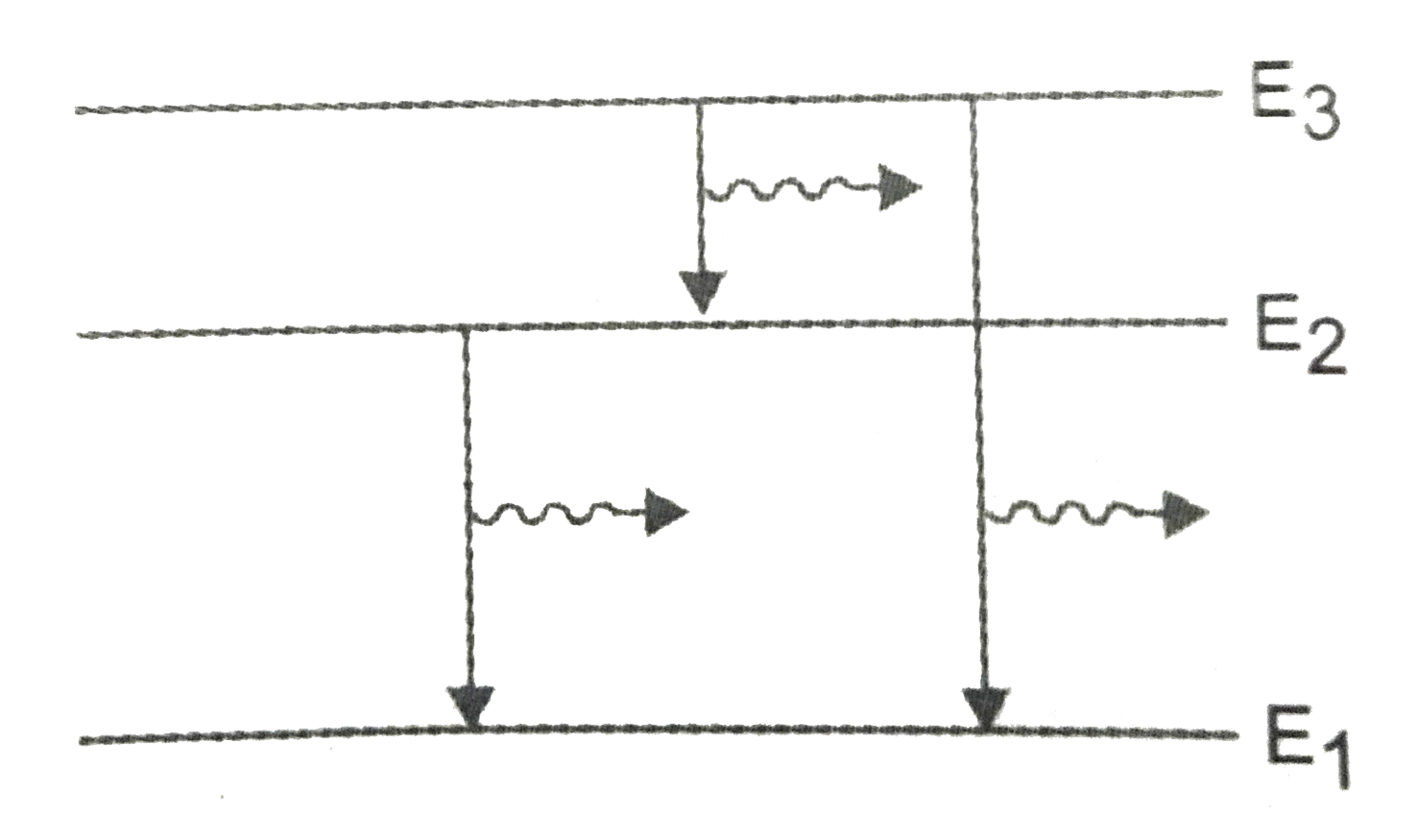A double ionised lithium atom is hydrogen like with atomic number 3
(i)Find the wavelength of the radiation to excite the electron in Li++from the first to the third bohr orbit (lonisation energy of the hydrogen atom equals 13.6eV
(ii) How many spectral lines are observed in the emission spectrum of the above excited system ?
In the nth orbit of hydrogen atom, energy of electron, En=−13.6n2eV
In case of hydrogen like atom, the energy is En'=32(En)=−9×13.6n2eV
for n=1, E1'=−9×13.6eV,
for n=3, E3'=−9×13.632=−13.6eV
Energy of photon required to excite the electron form n=1 to n=3 is
hv=E3'−E1'=−13.6−(−9×13.6)=8×13.6eV
hcλ=8×13.6×1.6×10−19(joule)
λ=hc8×13.6×1.6×10−19=6.63×10−34×3×1088×13.6×1.6×10−19=114.25×10−10m=114.25Å
This is the wavelength of the radiation requirede. The possible spectral lines observed in this system are three : E3→E1,E3→E2andE2→E1 as shown in fig.

Topper's Solved these Questions
- ATOMS AND NUCLEIBOOK - PRADEEPCHAPTER - ATOMS AND NUCLEIEXERCISE - (II) very short answer 16
1 Videos
- ATOMS AND NUCLEIBOOK - PRADEEPCHAPTER - ATOMS AND NUCLEIEXERCISE - (I) Short Answer questions 1
1 Videos
- COMMUNICATION SYSTEMSBOOK - PRADEEPCHAPTER - COMMUNICATION SYSTEMSEXERCISE - MODEL TEST PAPER-2
9 Videos
Similar Questions
A double ionised lithium atom is hydrogen like with atomic number 3
(i)Find the wavelength of the radiation to excite the electron in Li++from the first to the third bohr orbit (lonisection energy of the hydrogen atom equals 13.6)
(ii) How many spectral lines are observed in the emission spetrum of the above excled system ?
View SolutionA doubly ionized lithium atom is hydrogen like with atomic number 3. Find the wavelength of the radiation required to excite the electron in Li++ from to the third Bohr orbit (ionization energy of the hydrogen atom equals 13.6 eV).
View Solution
Knowledge Check
A doubly ionized lithim atom is hydrogen like with atomic number 3. Find the wavelength of the radiation required to excite the electron in Li2+ from the first to the third Bohr orbit. The ionization energy of the hydrogen atom is 13.6 eV. (Take hc=1240 eV nm)
A11.4 nmB10.7 nmC12.7 nmD13.4 nmA double charged lithium atom is equivalent to hydrogen whose atomic number is 3. The wavelength of required radiation for emitted electron from first to third Bohr orbit in Li++ will be (Ionization energy of hydrogen atom is 13.6eV)
A18.51ÅB177.17ÅC142.25ÅD113.74Å(a) (i) Find the wavelength of the radiation required to excite thye elctron in Li(++) from the first to the third Bohr orbit.
(ii) How many spectal lines are observed in the emission spectrum of the above excited system ?
(b) The energy needed to detach the electron of a hydrogen-like ion in ground state in 4 rydberg.
(i) What is the wavelength of the radiation emitted when the electron jumps from the first excited state ot the ground state ?
(ii) What is the radius of first orbit ?
(c ) A hydrogen sample is prepared in a particular excited state A. Photons of energy 2.55 eV get absorbed into the sample to take some electrons to a further excited state B. Find the quantum number of the A and B.
(d) A hydrogen atom in a state having a binding energy of 0.85 eV makes transition to a state with excitation energy 10.2 eV. (i) Identify the quantum number n of the upper and the lower energy states.
Find λ.A108.8 e V ,3B13.6e V, 4C54.4 e V, 2D10.2 e V, 3
A doubly ionized lithium atom is hydrogen like with atomic
. number 3. Find the wavelength of the radiation to excite the electron in
. Li++ form the first to the third Bohr orbit. The ionization energy of the hydrogen
. Atom is 13.6V.
View SolutionConsider a gas consisting Li+2 (which is hydrogen like ion).
(a) Find the wavelength of radiation required to excite the electron in Li++ from n=1 and n=3. (Ionisation energy of the hydrogen atom equals 13.6eV).
(b) How many spectral lines are observed in the emission spectrum of the above excited system?
View Solution(a) (i) Find the wavelength of the radiation required to excite thye elctron in Li(++) from the first to the third Bohr orbit.
(ii) How many spectal lines are observed in the emission spectrum of the above excited system ?
(b) The energy needed to detach the electron of a hydrogen-like ion in ground state in 4 rydberg.
(i) What is the wavelength of the radiation emitted when the electron jumps from the first excited state ot the ground state ?
(ii) What is the radius of first orbit ?
(c ) A hydrogen sample is prepared in a particular excited state A. Photons of energy 2.55 eV get absorbed into the sample to take some electrons to a further excited state B. Find the quantum number of the A and B.
(d) A hydrogen atom in a state having a binding energy of 0.85 eV makes transition to a state with excitation energy 10.2 eV. (i) Identify the quantum number n of the upper and the lower energy states.
Find λ.
View SolutionA doubly ionized lithium atom is hydrogen like with atomic number 3. Find the electron in (Li++) from the first to thired Bohr orbit . The ionization energy of the hydrogen atom is 13.6eV.
View Solution(a)Find the wavelength of the radiation required to excited the electron is Li++ from the first to the third Bohr orbit (b) How many speciral are obseved in the emission apactrum of the above excited system?
View Solution
